John Keells, one of Sri Lanka’s biggest conglomerates, has accessed the overseas syndicated loan market for a $395m borrowing. Meanwhile, the Sri Lankan Ministry of Policy Planning, Economic Affairs, Child Youth and Cultural Affairs sent out a request for proposals in June, seeking a loan of up to $500m.
A number of banks are eyeing the sovereign deal, as Sri Lanka is a rare visitor to the syndicated loan market. But it could start to be more active. In a recent Reuters report, finance minister Ravi Karunanayake said the country was looking to take advantage of low Libor levels. The country had been receiving unsolicited bids from banks like BNP Paribas, Credit Suisse and Barclays at a margin of 325bp-375bp, he added.
With lenders facing intense competition in winning mandates for deals from countries such as India and China, originators are looking further afield to new markets, including Sri Lanka, for opportunities.
“Banks are looking for new, stable places to invest and Sri Lanka provides that,” said a senior loan syndicator. “The yields are higher than India and it has quite an interesting track record. Most of the international, Indian and Middle Eastern banks would be interested. There are many banks which haven’t lent to Sri Lanka before and some may open lines to get a good bit of variety.”
Not everyone was convinced, though. One banker at an Indian lender said he would think twice when putting a proposal for Sri Lanka in front of his credit committee as its rating was low, making it harder for him to justify capital costs.
The country, which is rated B1 by Moody’s, emerged from a devastating civil war only in 2009. This is cited as one of the reasons its corporates have not accessed external debt very actively.
“It’s come out of the war only a few years back — till then it was unstable and like other frontier countries with a troubled history it was the government and banks with a sovereign angle that were the active fundraisers,” said a banker who specialises in South Asia at an international bank. He noted that these issuers had a good track record in terms of repayment and there had been no defaults.
Another reason the country has rarely been in the loans market is the relative attractiveness of the bond market, said a market observer.
“This is my understanding for Sri Lanka — they’ve relied more on the bond market because in 2013 the government took out rules withdrawing withholding tax on interest payments on bonds,” he said. “This led to an increase in bond fundraising through 2013 and 2014.”
A question of scale
Bankers do not expect a major turnaround in terms of offshore syndications for Sri Lankan corporates, as even some of its biggest companies are relatively small.
“I am not very positive [on the potential for more corporate overseas loans from Sri Lanka],” said the South Asia specialist. “They just don’t have that kind of scale. It doesn’t have that kind of volume. Banks would generally look at credit lines of one to three years max for Sri Lankan corporates, I think.”
He saw Sri Lankan corporate deals pricing in the late 300s for three year liquidity.
Among the larger corporates in the country, which has a population of 21m, John Keells posted a turnover of Srp91.58bn ($672.5m) during the year that ended on March 31, 2015. Hayleys, another large conglomerate with interests in manufacturing and agriculture, posted revenue of Srp92.6bn ($679.7m).
Upcoming parliamentary elections may also lead companies to defer plans for raising external debt, said the market observer. “It [election uncertainty] is something that would deter foreign investors. It is an attractive investment destination but they need to have that clarity.”
Sri Lanka is due to go to polls on August 17. Ousted former president Mahinda Rajapaksa is reported to be eyeing the post of prime minister, according to a Wall Street Journal report on July 1.

